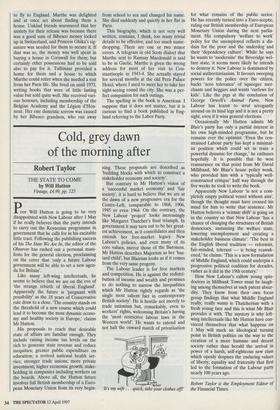Cold, grey dawn of the morning after
Robert Taylor
THE STATE TO COME by Will Hutton Vintage, 14.99, pp. 125 Poor Will Hutton is going to be very disappointed with New Labour after 1 May if he really believes that the party intends to carry out the Keynesian programme in government that he calls for in his excitable little tract. Following the publishing success of his The State We Are In, the editor of the Observer has rushed out a personal mani- festo for the general election, proclaiming on the cover that 'only a future labour government will be able to set a new agen- da for Britain'.
Like many left-wing intellectuals, he seems to believe that we are on the eve of 'the strange rebirth of liberal England'. Apparently the future is 'pregnant with possibility' as the 18 years of Conservative rule draw to a close. 'The country stands on the threshold of a new course which could lead it to become the most dynamic econo- my and healthy society in Europe,' claims Mr Hutton.
His proposals to reach that desirable state of affairs are familiar enough. They include raising income tax levels on the rich to generate state revenue and reduce inequities; greater public expenditure on education; a revived national health ser- vice; stronger trade unions; more private investment; higher economic growth; stake- holding in companies including workers on the boards. Above all, the Hutton future involves full British membership of a Euro- pean Monetary Union from its very begin- ning. These proposals are described as 'building blocks with which to construct a stakeholder economy and society'.
But contrary to Mr Hutton's vision of a 'successful market economy' and 'fair society', it is hard to believe that we are at the dawn of a new progressive era for the Centre-Left, comparable to 1868, 1906, 1945 or even 1964. On the contrary, the New Labour 'project' looks increasingly like Margaret Thatcher's final triumph. In government it may turn out to be her great- est achievement, as it consolidates and then extends her free-market legacy. New Labour's policies, and even many of its core values, mirror those of the Baroness. Mr Hutton describes Majorism as her 'bas- tard child', but Blairism looks as if it comes from the very same progeny.
The Labour leader is for free markets and competition. He is against the redistri- bution of income and wealth and promises to do nothing to narrow the inequalities which Mr Hutton rightly regards as 'the single most salient fact in contemporary British society'. He is hostile not merely to trade unionism but, remarkably, even to workers' rights, welcoming Britain's having the 'most restrictive labour laws in the Western world'. He wants to extend and not halt the onward march of privatisation for what remains of the public sector. He has recently turned into a Euro-sceptic, ruling out British membership of European Monetary Union during the next parlia- ment. His compulsory 'welfare to work' policy for the unemployed reflects a dis- dain for the poor and the underdog and their 'dependency culture'. While he says he wants to 'modernise' the Beveridge wel- fare state, it seems more likely he intends to destroy it. New Labour is dominated by social authoritarianism. It favours sweeping powers for the police over the citizen, backs 'zero tolerance' of squeegee mer- chants and beggars and wants 'curfews for kids'. Like the pigs at the conclusion of George Orwell's Animal Farm, New Labour has learnt to strut arrogantly around on its hind legs and it is not a pretty sight, even if it wins general elections.
Occasionally Mr Hutton admits Mr Blair's party has only a partial interest in his own high-minded programme, but he remains ever the optimist. 'Even the con- strained Labour party has kept a minimal- ist position which could set in train a powerful dynamic for change,' he enthuses hopefully. It is possible that he won reassurance on that point from Mr David Milliband, Mr Blair's house policy wonlc, who provided him with a 'typically well- constructed critique' half way through the five weeks he took to write the book.
Apparently New Labour 'is not a com- pletely empty political vessel without aim', though the thought must have crossed his mind for him to write that sentence. Mr Hutton believes a 'seismic shift' is going on in the country so that New Labour 'has a chance of changing the structures of British democracy, sustaining the welfare state, lowering unemployment and creating a stakeholder business climate'. 'The best in the English liberal tradition — reformist, fair-minded, tolerant — is being reawak- ened,' he claims. 'This is a new formulation of Middle England, which could underpin a progressive political coalition for decades, rather as it did in the 19th century.'
How New Labour's callow young spin- doctors in Millbank Tower must be laugh- ing among themselves at such patent absur- dity. They know from their own focus group findings that what Middle England really, really wants is Thatcherism with a fresh young face and this is what Mr Blair provides it with. The mystery is why left- wing intellectuals like Mr Hutton have con- vinced themselves that what happens on 1 May will mark an ideological turning point in British politics on the way to the creation of a more humane and decent society rather than herald the arrival in power of a harsh, self-righteous new class which openly despises the enduring values of liberty, equality and fraternity that first led to the formation of the Labour party nearly 100 years ago.
Robert Taylor is the Employment Editor of the Financial Times.


































































 Previous page
Previous page